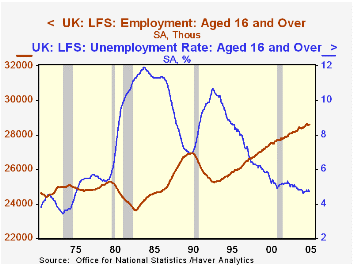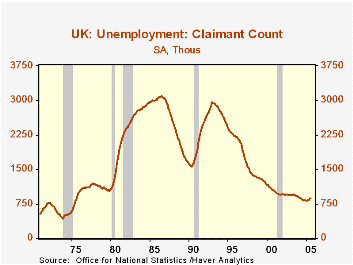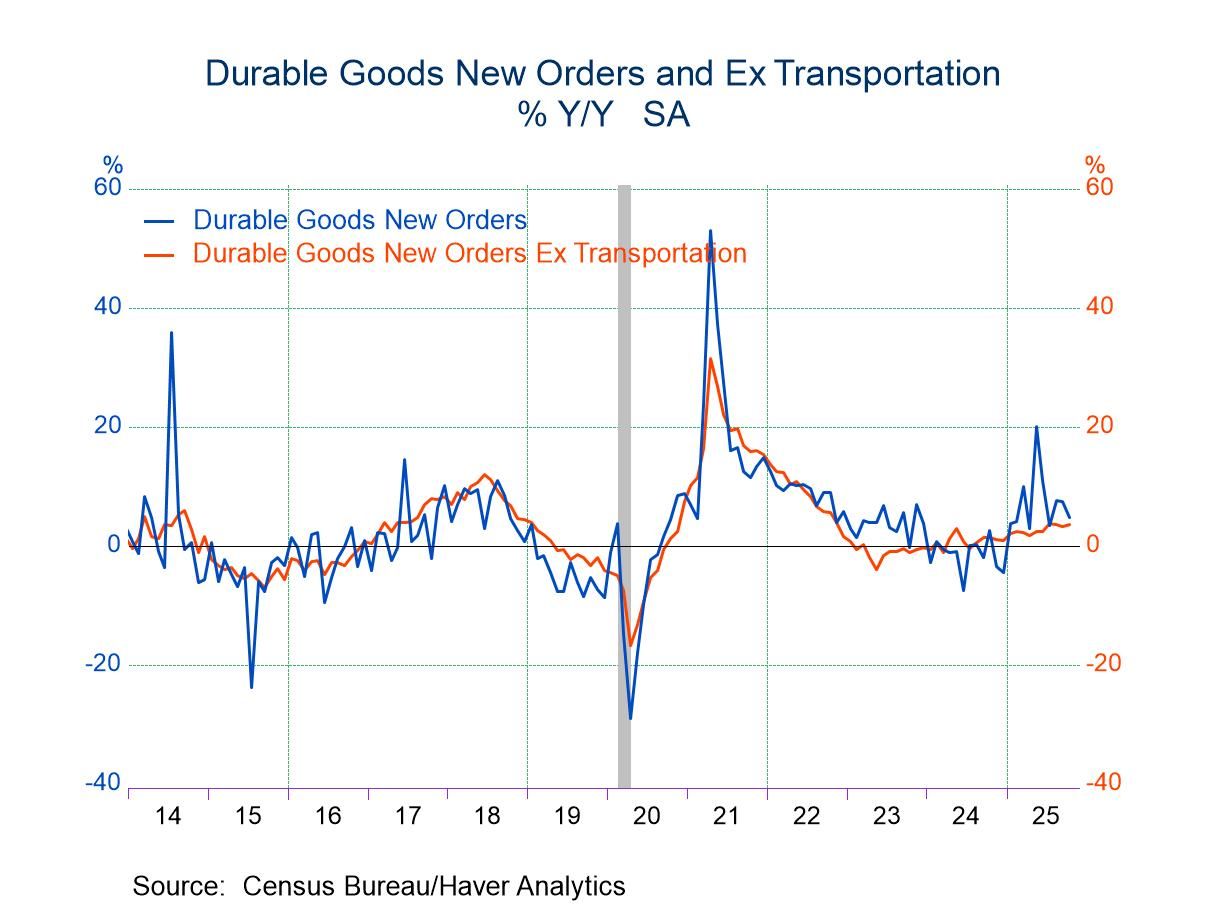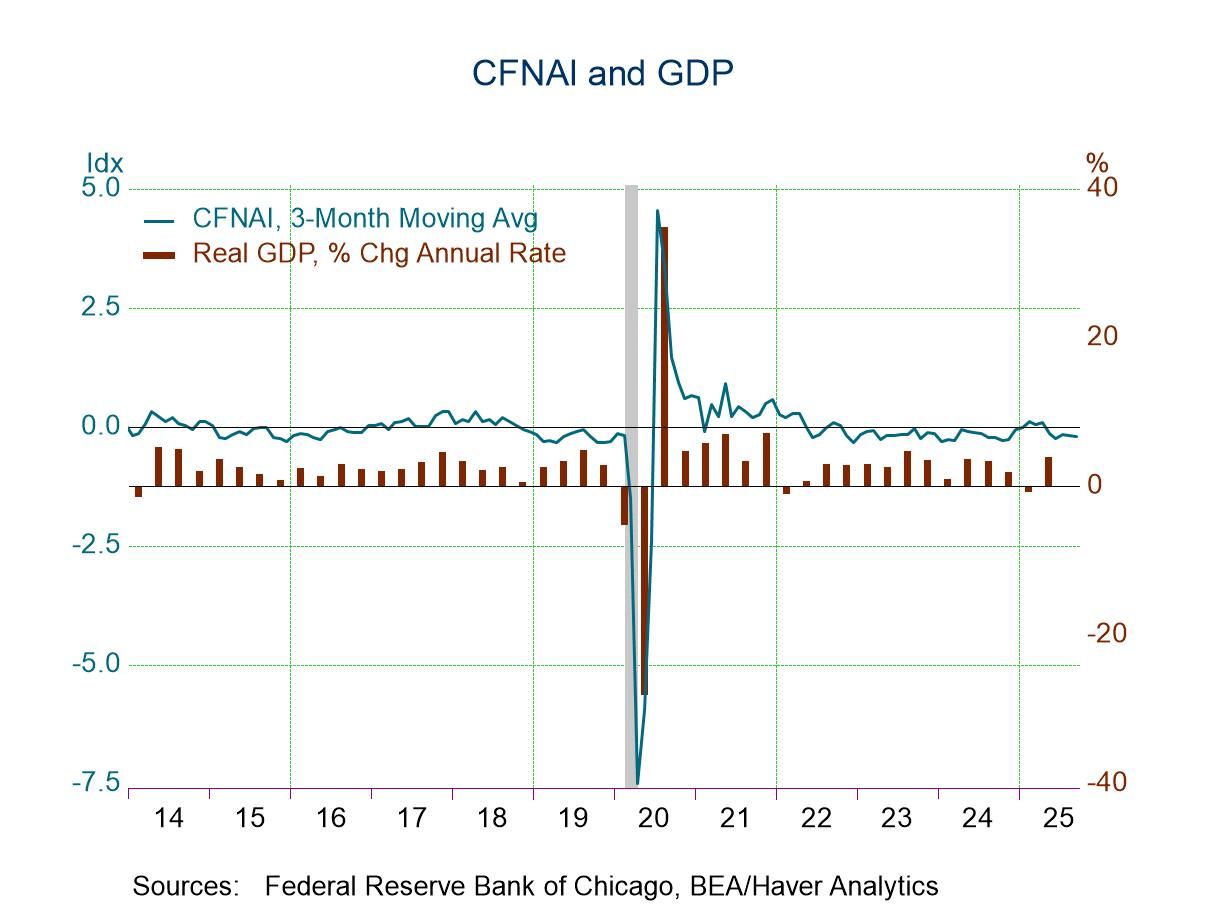 Global| Aug 17 2005
Global| Aug 17 2005UK Employment Basically Flat through May, Jobless Benefit Claims Creeping Higher
Summary
UK labor markets have moved little in the last few months. We last wrote about the Labor Force Survey in April, covering the February information. The unemployment rate then was 4.7% and it has remained at that level or at 4.8% [...]

UK labor markets have moved little in the last few months. We last wrote about the Labor Force Survey in April, covering the February information. The unemployment rate then was 4.7% and it has remained at that level or at 4.8% through May. Employment has also held within a tight range: it reached a peak of 28.64 million in January, and has lost 5,000 on net in the succeeding four months; most recently, it gained 25,000 from the April data to May. All of these figures are centered 3-month moving averages, so this specific report released today by the Office of National Statistics (ONS) covers April, May and June, that is, the second quarter.
Press reports and the ONS itself prefer to emphasize these comparisons with three months ago. Over that time span, despite the flat unemployment rate, the number unemployed rose 27,000 and the number of people employed fell 16,000, a weaker-than-desirable performance. Additionally, the number of people claiming jobless benefits, the so-called claimant count, has increased; 866,000 people filed for benefits in July (a figure for the single month, not a multi-period average), a sixth consecutive increase totaling about 52,000. As seen in the second graph, such upturns are not frequent, although those associated with business cycles have generally been more pointed with an abrupt steep rise. So while this current modest rise is not encouraging, neither is it a clear sign of a negative direction for the UK economy. 
A Bank of England action earlier this month reflected the same kind of ambivalence. On August 4, the Bank reduced its repo rate from 4.75% to 4.50%; the minutes of that monetary policy meeting, which were published today, reveal that the vote was 5 to 4, with the Bank's Governor, Mervyn King, in the dissenting minority. This is the first time that the head of the Bank was on the short end of such a policy vote since the BoE became independent of the UK Treasury in 1997. In the United States, this has probably not ever happened, with just one near-miss to our recollection, during the Paul Volcker era in the early 1980s. Mr. King was concerned about inflation more than unemployment, and in fact, the consumer price data for July, issued yesterday, show a similar picture to that in the United States. Total CPI for the UK was up 2.3% year-on-year through July, but the index excluding energy is up "just" 1.9%. [US price numbers, recall, were up 0.5% in the month, but only just over 0.1% excluding food and energy.] The UK core inflation rate itself is increasing. It is not hard to see that the BoE governor and officers might have anticipated such an unpleasant combination as higher inflation and a stalling labor market and so moved very gingerly to alter their policy position.
| UK Labor Force Survey All seasonally adjusted |
July 2005 | June 2005 | May 2005 | Apr 2005 | 2004 | 2003 | 2002 |
|---|---|---|---|---|---|---|---|
| Unemployment Rate (%) | 4.7* | 4.8* | 4.7 | 5.0 | 5.2 | ||
| Claimant Count (thous) | 866 | 863 | 856 | 842 | 854 | 933 | 947 |
| Employment (mil) | 28.59* | 28.57* | 28.44 | 28.18 | 27.91 | ||
| Change (thous) | +25K | -11K | +0.9% | +0.9% | +0.8% | ||
| Average Earnings Index Incl Bonuses: "Headline Rate"(%)** | 4.2 | 4.1 | 4.6 | 4.4 | 3.4 | 3.5 | |
| Average Earnings Index Ex Bonuses: "Headline Rate" (%)** | 4.0 | 4.0 | 4.1 | 4.2 | 3.6 | 4.0 |
Carol Stone, CBE
AuthorMore in Author Profile »Carol Stone, CBE came to Haver Analytics in 2003 following more than 35 years as a financial market economist at major Wall Street financial institutions, most especially Merrill Lynch and Nomura Securities. She had broad experience in analysis and forecasting of flow-of-funds accounts, the federal budget and Federal Reserve operations. At Nomura Securities, among other duties, she developed various indicator forecasting tools and edited a daily global publication produced in London and New York for readers in Tokyo. At Haver Analytics, Carol was a member of the Research Department, aiding database managers with research and documentation efforts, as well as posting commentary on select economic reports. In addition, she conducted Ways-of-the-World, a blog on economic issues for an Episcopal-Church-affiliated website, The Geranium Farm. During her career, Carol served as an officer of the Money Marketeers and the Downtown Economists Club. She had a PhD from NYU's Stern School of Business. She lived in Brooklyn, New York, and had a weekend home on Long Island.





